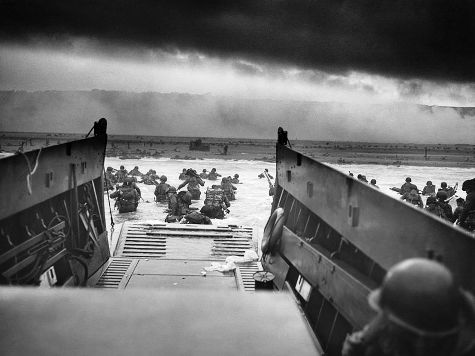
I’ve sometimes thought it a misnomer to refer to the veterans of World War II as the “Greatest Generation.” The reverence may be justified but I’m uncomfortable with the sly implication that those who took part were somehow possessed of superhuman qualities.
What makes their achievement so special, surely, is that they were ordinary people prey to exactly the same fears, hopes and instincts as the rest of us. Nobody who waded ashore or parachuted into Normandy seventy years ago fancied that it would be a glorious thing to die young.
This has certainly been my experience when travelling to Normandy with veterans. They’re always at pains to play down what they did that day. Partly this is the quiet modesty and generosity of spirit you invariably find among men who have been at the sharp end.
Partly, though, it’s true: the Allies were a civilian army of would-be bank clerks, florists, veterinary surgeons, masters of foxhounds, footballers, you name it, who found themselves in extraordinary circumstances and rose to the occasion.
There is too, I fear, something a bit triumphalist and pat about the Greatest Generation tag. It conveys an idea – to which I very much cleaved myself when I was younger – that war is a glorious thing and combat something to which all young men should aspire.
Don’t get me wrong: I still find myself almost prostrate with admiration and envy for those who have “seen the elephant.” But the older I get – and maybe more significantly, the closer my children get to conscription age – the harder I find it to see war in heroic terms.
Take D-Day – the “Great Endeavor”, as Eisenhower called it. Ike was right too. Logistically, tactically, strategically, meteorologically, it must rank among the greatest achievements in military history. But I doubt this can have come as much consolation to the mothers of the 946 American boys killed off the Devon coast in the disastrous Exercise Tiger (one of the reasons why more servicemen died in training for D-Day than were killed actually on D-Day). Nor, I think, should the operation’s success distract us from some of the tremendous cock-ups which might so easily have made it fail.
Worst of these, on D-Day, I’d argue was the poor decision-making and feeble planning which led to the debacle on Omaha Beach. One or two men from 116th Infantry, 29th Division did some extraordinary things that day. But the vast majority were shot – or, as often, drowned – before they had the chance.
Why did this happen? Two main reasons. First, the American planners decided not to heed British advice to use specialist armour – “Hobart’s Funnies” – such as the Armoured Vehicles Royal Engineers (AVREs) which could have blown a breach in the German defences. Second, the landing craft and swimming tanks were launched – against naval advice – too far offshore with the result that the infantrymen were virtually too seasick to fight and most of the tanks drowned in the choppy seas. Do the fools responsible for this disaster also qualify as the “Greatest Generation”?
I don’t wish, in any way to diminish the courage, fortitude and self-sacrifice of those who fought at D-Day and beyond; merely to put what they did into its hideous, chaotic context. Men don’t always get this, largely I think because we’re biologically programmed for war.
But women do – and it’s from female veterans of the war that I’ve heard the most chilling testimonies, like this one from a well-spoken, nicely-brought-up young lady who served as a nurse.
“War is having to break the news to a young man who has had his face blown off the news that his parents have just been killed in an air raid.”

COMMENTS
Please let us know if you're having issues with commenting.